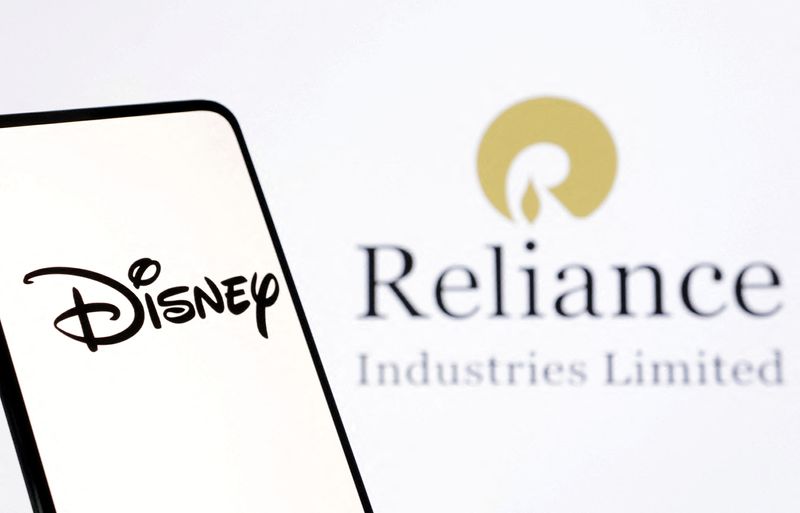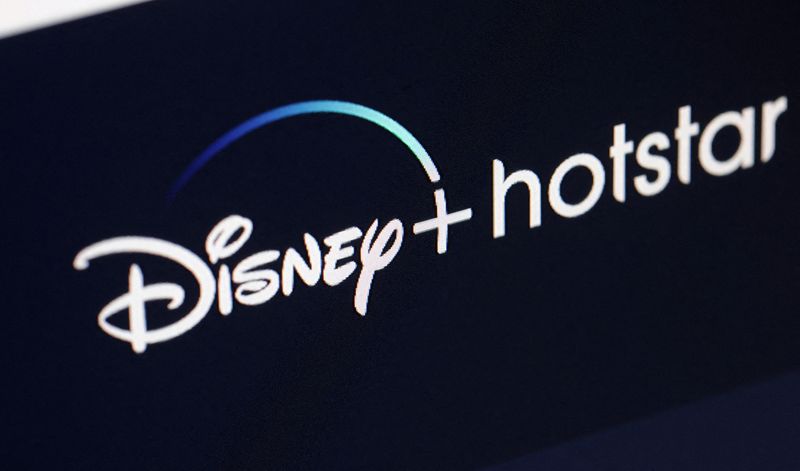By Aditya Kalra, Munsif Vengattil and Arpan Chaturvedi
NEW DELHI (Reuters) - A merger of Walt Disney (NYSE:DIS)'s India unit and billionaire Mukesh Ambani's media business would create an entertainment powerhouse in India, but lawyers say any deal would draw intense antitrust scrutiny and assets would likely need to be shed.
Disney and India's Reliance, which each have a major streaming service as well as 120 TV channels between them, are looking at merging into an entity in which Ambani's group would likely have a majority stake, sources said this week.
In particular, a deal could benefit Disney whose Hotstar streaming app has been loss-making. CEO Bob Iger said last month that while Disney's TV channels were doing well in India, other parts of the business were struggling and it was seeking to "improve the bottom line."
If a deal was struck, it would be the second to seismically reshape India's TV and streaming landscape as Japan's Sony (NYSE:SONY) also plans to merge its India business with India's Zee Entertainment.
The Zee-Sony plan cleared a review by the Competition Commission of India (CCI) last year and could close in the coming weeks. The two companies have said they will divest three of Zee's Hindi TV channels as part of their agreement for regulatory acceptance.
Although Netflix (NASDAQ:NFLX) and Amazon (NASDAQ:AMZN) also compete in India's $28 billion media and entertainment market, the emergence of two behemoths would probably create a duopoly wielding anti-competitive power over advertisers, users and content creators, antitrust lawyers said.
"This deal may get closer scrutiny because of the increased concentration of market power post the Zee-Sony merger. That makes their path to CCI approval more challenging," said Avimukt Dar, founding partner at India's IndusLaw.
Disney declined to comment. Reliance, its broadcast unit Viacom18 and the CCI did not respond to Reuters queries.
One key area of regulatory scrutiny for a Disney-Reliance merger would be their streaming businesses and their power over advertising during cricket - a sport that commands fanatical devotion in India.
Disney Hotstar, India's biggest streaming app with 38 million users, owns the rights for International Cricket Council's matches in India until 2027, while Reliance's growing JioCinema app has the rights for popular cricket league IPL.
The CCI would be worried that the "combined entity, due to its strong market presence in streaming can command their own rates and advertisers will be left without bargaining power," said Vaibhav Choukse, head of competition law at Indian law firm JSA.
In TV too, there is much that might displease regulators.
Viacom18's 38 channels include Comedy Central and Nickelodeon, while Disney, whose Star brand has been a household name for decades in India, has 80.
Elara Capital estimates Disney and Viacom18 together will have the biggest share of the TV ads market at 43% while Zee-Sony would have 25%, making it difficult for others to compete.
Estimates from the CCI document approving the Zee-Sony merger also underscore the potential pricing power of a Disney and Viacom18 combination.
In Hindi entertainment channels, for example, as of last year Disney and Viacom18 had a combined share of 30% to 40%, compared with Zee-Sony's 30-35%, the document shows.
In local language Marathi channels, Disney had market share of 50-55% and when combined with Viacom18 that would rise to between 65% and 75%. In Bengali language entertainment channels, the two would command as much as 50% market share.

"If the market shares of the parties exceed 40-50% in any market, CCI is likely to conduct a detailed investigation," said Choukse.
While divesting certain channels would be an option to assuage CCI's concerns, the merged entity could also offer commitments to not raise ad rates for a certain period, according to Gautam Shahi of Dua Associates.
